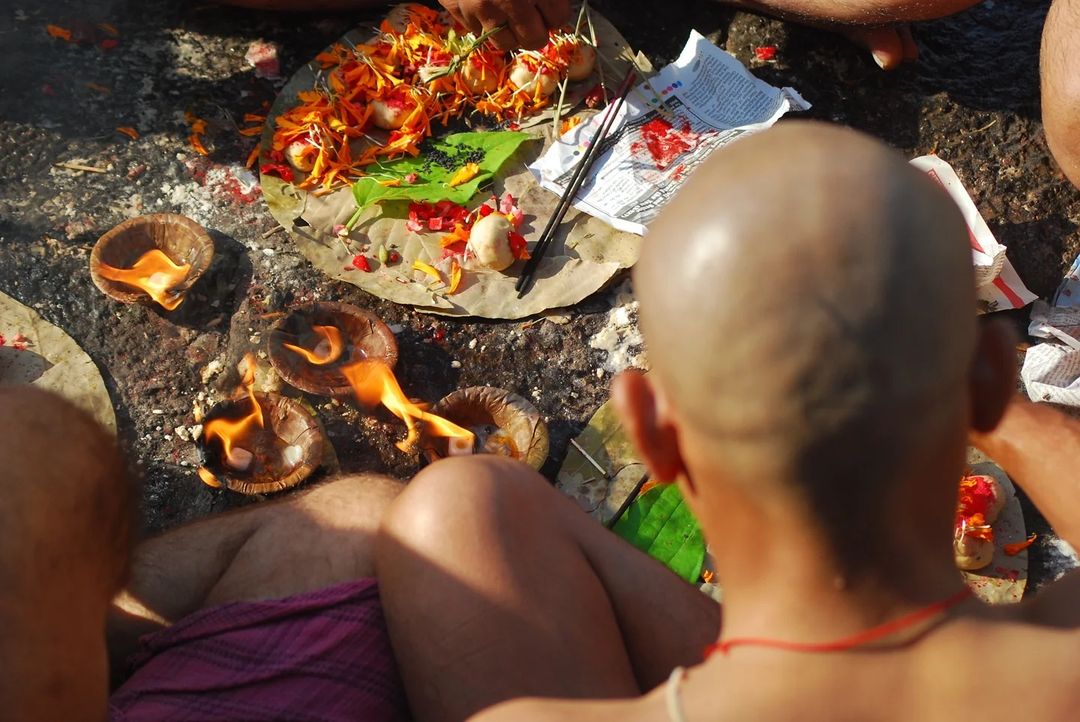In Hindu tradition, the concept of Pitra (or Pitru) holds a significant place, reflecting the belief in the continuing influence of deceased ancestors on the living. The dissatisfaction of these ancestors can lead to what is known as Pitra Dosh in one’s horoscope, which is believed to disrupt happiness, peace, and progress in an individual’s life.
Understanding Pitra and Pitra Dosh
Pitra is a Sanskrit term referring to deceased ancestors. According to Hindu beliefs, after a person’s death, their soul enters the abode of ancestors (Pitriloka) if the last rites (antyeshti) are properly performed. However, if these rituals are neglected, the soul may remain restless, causing Pitra Dosh in the descendant’s horoscope.
Pitra Dosh occurs when the ancestors are believed to be dissatisfied, and this dissatisfaction manifests as obstacles and hardships in the lives of their descendants. The removal of Pitra Dosh typically involves performing Pitru Tarpan and Shraddha rituals, which are meant to appease the ancestors and bring their blessings.
Performing Pitru Tarpan at Home
Modern lifestyles often make it challenging to perform traditional rituals. However, Pitru Tarpan can still be performed at home with the right ingredients and mantras. Here’s a simple guide to conducting these rituals:
- Ingredients: Water mixed with barley and sesame seeds.
- Mantras: Recite the appropriate Tarpan mantras, invoking the ancestors and offering water to them with reverence.
Who are Considered Ancestors?
In Hindu tradition, ancestors include three generations from both the paternal and maternal sides. For the paternal side, this includes the deceased father, grandfather, and great-grandfather. From the maternal side, it includes the deceased maternal grandfather, great-grandfather, and great-great-grandfather. These ancestors are honored during Pitru Paksha, a 15-day period dedicated to performing Shraddha and Tarpan rituals for their peace.
Significance of Pitru Paksha
Pitru Paksha, or the fortnight of ancestors, starts from the full moon day (Purnima) of the Hindu month Bhadrapada and lasts until the new moon day (Amavasya) of Ashwin. In 2024, Pitru Paksha begins on September 17 and ends on October 2. During this period, Hindus perform various rituals to honor and appease their ancestors.
Types of Tarpan and Shraddha
Types of Tarpan:
- Pitra Tarpan
- Manushya Tarpan (human sacrifice)
- Dev Tarpan
- Bhishma Tarpan
- Yam Tarpan
Types of Shraddha:
- Nitya Shraddha: Performed daily with simple offerings.
- Naimittik Shraddha: Conducted for specific occasions, such as a person’s death.
- Kamya Shraddha: Performed for fulfilling specific wishes.
- Vriddhi Shraddha: For auspicious occasions like births or marriages.
- Parvana Shraddha: Linked to festivals or specific dates like Pitru Paksha or Amavasya.
- Sapindan Shraddha: Transforms ancestors from ghostly realms to ancestral realms.
- Gosthi Shraddha: Performed collectively.
- Shuddhartha Shraddha: For purification purposes.
- Karmang Shraddha: Part of major religious ceremonies.
- Yatrarth Shraddha: For safe travels.
- Pushtyarth Shraddha: For physical and financial well-being.
The Role of Tarpan in Ancestral Worship
Tarpan is a ritual of offering water mixed with barley and sesame seeds to deities, sages, and ancestors to satisfy them and seek their blessings. Traditionally, the right to perform Tarpan is given to the son, but in his absence, it can be performed by other male relatives or even by the son-in-law.
Consequences of Neglecting Ancestors
Neglecting ancestral rituals can lead to the displeasure of the ancestors, resulting in various familial and personal issues, such as:
- Decreased wealth and prosperity.
- Obstacles in the happiness of children.
- Impediments to progeny growth.
- Adverse effects on career progression.
While its not proven if these problems actually happen but these are general beliefs that are prevalent in the society.
Identifying and Remedying Pitra Dosh
Pitra Dosh can be identified through astrological analysis, particularly focusing on the ninth house of the ascendant, the lord of the ninth house, and the Moon. The presence of malefic planets like Saturn, Rahu, or Ketu affecting the Sun and Moon can exacerbate the issue. Remedies include performing Tarpan and Shraddha rituals to appease the restless souls of ancestors and seek their blessings for peace and progress.
In summary, understanding and addressing Pitra Dosh through proper rituals and offerings are integral to maintaining familial harmony and seeking the blessings of ancestors in Hindu tradition.
To know more about pilgrimage places for Pitru Dosh, click here







